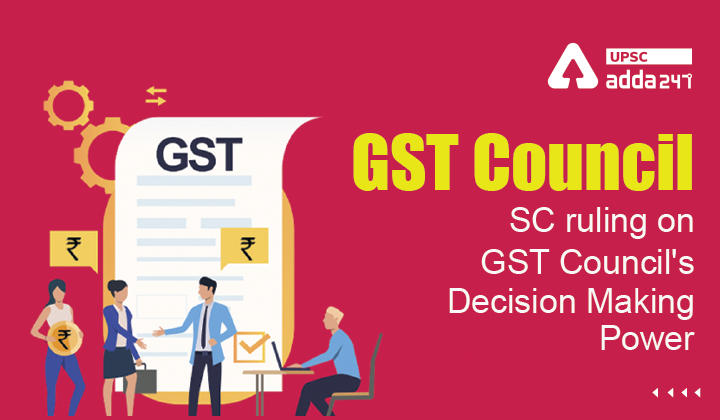Table of Contents
GST Council Meeting- Relevance for UPSC Exam
- GS Paper 2: Governance, Administration and Challenges- Government policies and interventions for development in various sectors and issues arising out of their design and implementation.
GST Council Meeting in news
- The Supreme Court ruled on Thursday (May 19) that recommendations of the Goods and Services Tax (GST) Council only have persuasive value, and cannot be binding on the Centre and states.
- While the Centre has said that the decision does not bring any change to the already existing framework, some Opposition-ruled states have stated that it would give them greater space to take decisions in the federal structure.
GST Council Case
- SC Order: SC upheld an order by the Gujarat High Court that had quashed the levy of Integrated GST (IGST) on the component of ocean freight paid by a foreign seller to a foreign shipping line, on a reverse charge basis.
- Union of India and Anr versus M/s Mohit Minerals Through Director Case: In its order, Gujarat High Court had quashed the Central notification levying IGST on importers for ocean freight.
- It held that GST is paid by the supplier, but if the shipping line is located in a non-taxable territory, then GST is payable by the importer, the recipient of service.
The Editorial Analysis- Extending GST Compensation as a Reform Catalyst
जीएसटी परिषद- जीएसटी परिषद के निर्णय लेने की शक्ति पर सर्वोच्च न्यायालय का निर्णय
Supreme Court’s Observation on Federalism
- Federalism in India is “a dialogue in which the states and the Centre constantly engage in conversations”.
- Although the Constitution confers “the Union with a higher share of power in certain situations to prevent chaos and provide security”, states “can still resist the mandates of the Union by using different forms of political contestation”.
- The SC Bench said that “It is not imperative that one of the federal units (Centre or states) must always possess a higher share of power over the other units,”
- Equal Legislative power: The court pointed out that Article 246A of the Constitution stipulates that both Parliament and state legislatures have “simultaneous” power to legislate on GST.
- It said that recommendations of the GST Council “are the product of a collaborative dialogue involving the Union and States”.
GST Council- Key Points
- Background: The Parliament passed the 101st Amendment Act of 2016 which paved the way for the introduction of the goods and services tax (GST) in the country. The GST Council was established to-
- To ensure smooth and efficient administration of the GST tax and
- Cooperation and coordination between the centre and the states.
- About GST Council: The 101st amendment inserted a new Article 279-A in the Constitution of India. This article empowered the President to constitute a GST Council by an order.
- Secretariat: located in New Delhi and the Union Revenue Secretary acts as the ex-officio Secretary to the Council.
- The GST Council is considered as a constitutional federal body where both the centre and the states get due representation.
- Mandate of GST Council: Responsible for making recommendations to the Union and State Government on issues related to Goods and Service Tax.
- It is the first constitutional federal body vested with powers to take all major decisions relating to GST.
- Vision: To establish the highest standards of the cooperative federation in the functioning of the Council.
- Composition of the Goods and Services Tax (GST) Council: It consists of the following members-
- Chairperson: The Union Finance Minister
- The Union Minister of State in charge of Revenue or Finance
- Ministers in-charge of Finance or Taxation of all the States
- Vice-chairperson: The members of the Council from the states have to choose one amongst themselves to be the Vice-Chairperson of the Council.
- Chairperson of the Central Board of Excise and Customs (CBEC): to be included as a permanent invitee (non-voting) to all proceedings of the Council.





 TSPSC Group 1 Question Paper 2024, Downl...
TSPSC Group 1 Question Paper 2024, Downl...
 TSPSC Group 1 Answer key 2024 Out, Downl...
TSPSC Group 1 Answer key 2024 Out, Downl...
 UPSC Prelims 2024 Question Paper, Downlo...
UPSC Prelims 2024 Question Paper, Downlo...
